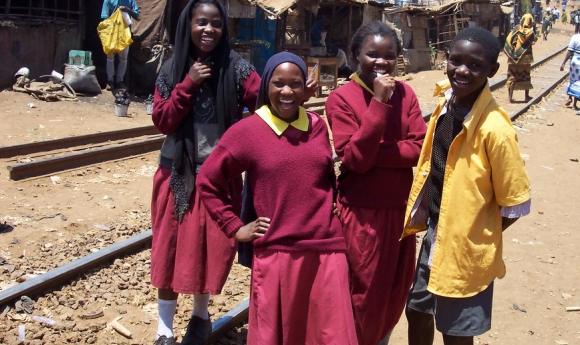“LIKE many other Western countries, my home country of Australia is reluctant to support development in all its forms,” writes Caroline Marohasy in an article just published by New Internationalist. In the article, entitled “Menstrual sanitation is not just a ‘lady issue'”, Caroline explains that…
“WE liberally support causes like AIDS or infant mortality prevention, but equally important issues like female hygiene and sanitation attract minimal attention.
Yet investment in projects that directly support women and girls is essential to reducing poverty. In 2012, the UN Secretary General Ban Ki-moon said that ‘the greatest return comes from investing in girls and women. When they are educated, they drive development in their families, communities and nations.’
A single year of primary education correlates with at least a 10-per-cent increase in a woman’s wages later in life, with the returns on a year of secondary education estimated to be double that. Moreover, educating girls remains the single best policy for reducing fertility.
– See more at: http://newint.org/blog/2013/07/25/menstrual-sanitation-development-education/?1946526611352061#sthash.CBlt7MAF.dpuf
***
The article was written by my daughter Caroline who has just spent 5 weeks in Kenya.
The photograph was taken by kyhm54 and is reproduced here under a Creative Commons Licence.

 Jennifer Marohasy BSc PhD is a critical thinker with expertise in the scientific method.
Jennifer Marohasy BSc PhD is a critical thinker with expertise in the scientific method.

You have every right to be very proud of your daughter.
Good for her and good for you.
Good on her Jennifer – as Deb said – you should be very proud of her.
she said:
I’m reminded of a video I saw recently where apparently some male had accused Bodyform of deceiving people with their advertisements showing women skiing and partaking in sports during menstruation.
So Bodyform replied with this Advertisement.
First, congratulations to your daughter for doing something positive to help others. This takes courage and character and she should be praised for trying to change peoples lives for the better.
However, I wish to question the current popular view that it is only concentrating on women’s and girl’s health in the third-world that we can make progress.
In 1994, the Macquarie University Library put on a special display on the ground floor that claimed that women’s health was being totally ignored.
In response to this display, I went to the Library computer index and did a search on the number of books that were being held in the Library concerning women’s and men’s health. Between 1970 and 1993, there were 14 times as many books on women’s health as men’s (female:male = 187:13). Of the 13 on men’s health, all but two concerned indigenous and gay men. Even during the 1970’s, the number of books on women’s health was five times that of men. This did not look like women’s health was being ignored to me.
Not wanting to rely on one source, I did a Medline search on the number of journal article abstracts that dealt with women’s health and men’s. Between 1982 and 1993, there were 30 abstracts on women’s health for every one on men’s health (females:male = 1372:46). Again, over half of the articles on men’s health were about gay and indigenous men.
So you can see, downplaying or ignoring the health and well-being of men and boys, while at the same time highlighting the health and well-being of women and girls has a long history.
Why is it so hard to care about the health and well-being of both sexes?
Interesting and vexed question Ian.
In places like Kenya where Jen’s daughter, Caroline, has been. . . there is no doubt that women are second class citizens and that includes a total ignorance of female health issues (amongst others like education)
But in a total paradox. . . in places like Australia. . . . the balance has gone out of whack in the opposite direction.
That lack of balance is even more prevalent in the education system . . . particularly in the primary/secondary system.
Go figure!????
Hi Ian,
Yes I’m not sure how the skew goes in Australia, but as far as Kenya, Debbie is quite on the money. In most of Africa women are second class citizens. I met with the head of Water and Sanitation for UN for all of Africa, and the Chief Economist for UN Development for Africa also, both based in Nairobi, and neither could/ would even talk about women’s health. Well, other than to talk about women having babies. Certainly none would say “menstruation” or “period”. Also anecdotal evidence suggests that gender targeted development policies have greater impacts on economic growth. I would guess this is because women are so far behind in most of Africa that a little goes a long way.
A Publication from 2012 called What Works in Girls Health has an incredible collection of studies, with research suggesting agriculture in Kenya would have 22% higher yields if women were educated to a similar standard, and overall GDP would have grown by an extra 1-2% per year across the 80s and 90s.
I don’t disagree that health and sanitation is a general problem – but there are a lot of WASH programs, and NGOs that deal with those. Menstrual challenges within development remain taboo and so go largely unreported.
Caroline